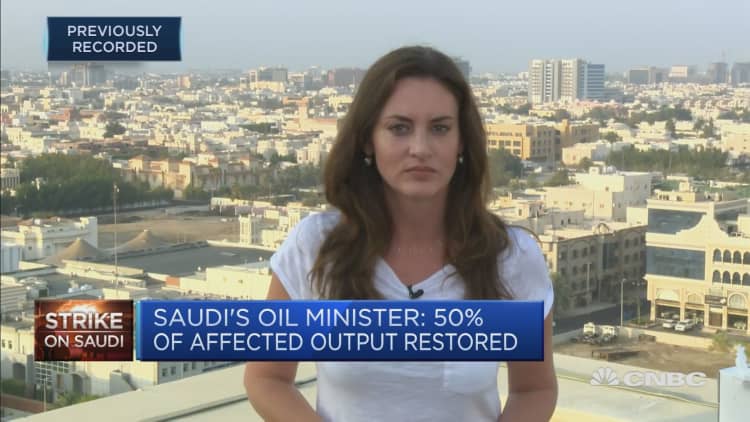
Saudi Arabia's pledge to fully restore crude production by the end of the month has prompted a flurry of oil market forecasters to reconsider their price projections.
"The oil market is facing challenging times," Carsten Fritsch, energy analyst at Commerzbank, said in a research note published Wednesday.
"Recent attacks on oil facilities in Saudi Arabia have painfully demonstrated the risks to oil supply, which is why short-term price spikes are possible at any time."
But, citing weakening market fundamentals, Fritsch explained that the German bank does not consider the recent price surge to be sustainable. Instead, Commerzbank expects the price of Brent oil to fall to $60 per barrel next year.
Energy Minister Prince Abdulaziz bin Salman said in a press conference Tuesday that the kingdom would soon have its oil supply back online after a series of drone attacks knocked out 5.7 million barrels of daily crude production.
Brent crude futures, the international benchmark, traded at around $63.87 on Wednesday, down around 1%. The contract had previously soared as much as 19.5% at the start of the week, climbing to $71.95 a barrel.
U.S. West Texas Intermediate (WTI) stood at $58.39 on Wednesday, more than 1.6% lower. The losses come less than 48 hours after WTI futures posted their biggest one-day climb since 2008.
'$70 ceiling for Brent crude'
Saudi Arabia's announcement on Tuesday "will temper bullish sentiment and probably sets a short-term price ceiling at $70 for Brent crude," analysts at risk consultancy Eurasia Group said in a research note published Tuesday.
"However, geopolitical risks remain high and a level of premium will probably be built in to integrate risks associated with U.S.-Iran and Saudi-Iran tensions."
The Saudis have grown increasingly confident that Iran directly launched a complex missile and drone attack from its southern territory, Reuters reported, citing people familiar with the investigation.
Iran has denied involvement in the attacks.
President Donald Trump said via Twitter on Wednesday that he had ordered Treasury Secretary Steven Mnuchin to "substantially increase sanctions" already imposed on Iran.
He did not give additional details on the move.
"As much as the Saudis have downplayed the extent of the latest outages, we should not be lulled into a false sense of security," Stephen Brennock, oil analyst at PVM Oil Associates, said in a research note on Wednesday.
"Tensions in the region are still running high and the specter of a further escalation is hanging over the oil market."
Risk premium 'likely to stay on oil prices'
Goldman Sachs reiterated its view on Wednesday that the global oil market has enough resources available to balance a larger outage, without requiring a Strategic Petroleum Reserve (SPR) release.
"This reinforces our view that prices are likely to remain below $75 (a barrel) Brent prices even if the outage proves much more persistent than current guidance," the U.S. investment bank said.
The SPR is an emergency stockpile of petroleum oil designed to mitigate a total depletion of crude during unstable times. It is managed by the U.S. Department of Energy.
Trump reportedly said Tuesday that he did not think it would be necessary to release oil from the SPR because oil prices have not jumped very much.
A tumultuous few days for the energy market prompted UBS on Wednesday to raise its three-month trading range by $6 to between $59 and $71 for Brent and $54 to $67 for WTI.
"Considering limited spare capacity outside Saudi Arabia and risks of renewed attacks on Saudi energy infrastructure, a risk premium is likely to stay on oil prices in the foreseeable future," Giovanni Staunovo, commodity analyst at UBS, said in a research note published Tuesday.
'Risk of miscalculation is high'
Meanwhile, the Economist Intelligence Unit (EIU) said Wednesday that it had upwardly revised its forecast for average oil prices for 2020, reflecting a higher geopolitical risk premium.
The EIU now expects Brent crude futures to average $63 a barrel next year, up from a previous estimate of $62 a barrel.
"This assumes no further escalation in U.S.-Iran tensions, but the risk of miscalculation remains high," Agathe Demarais, the EIU's global forecasting director, said via Twitter.
— CNBC's Yun Li contributed to this report.


